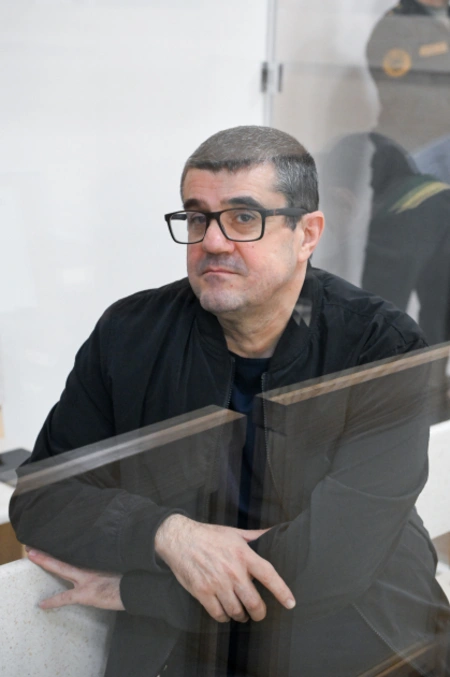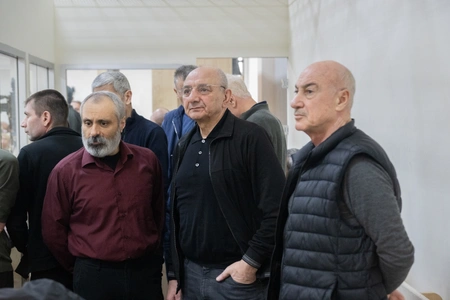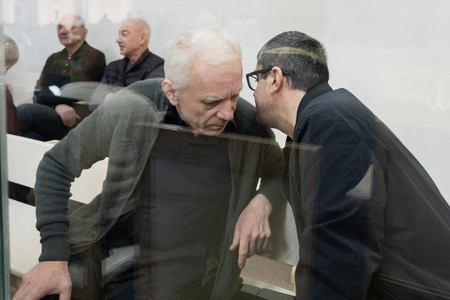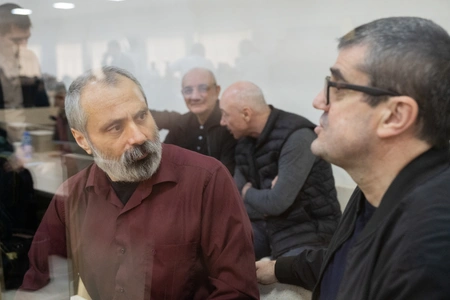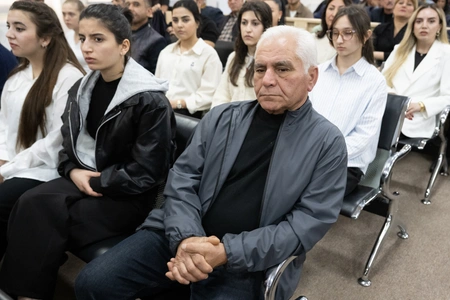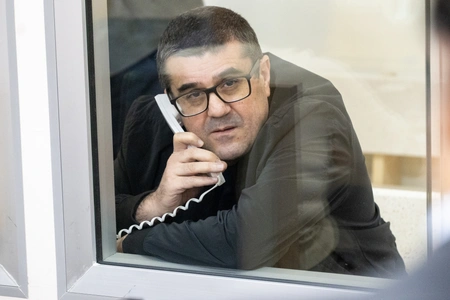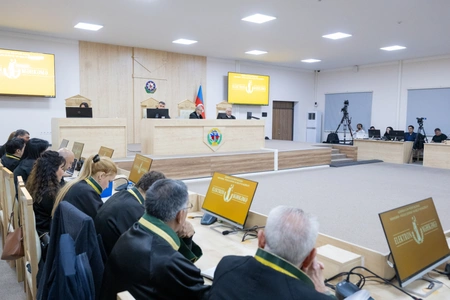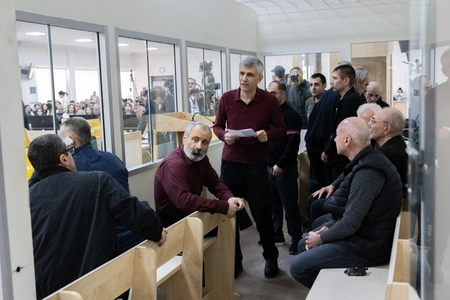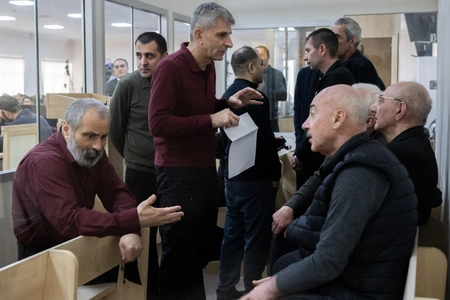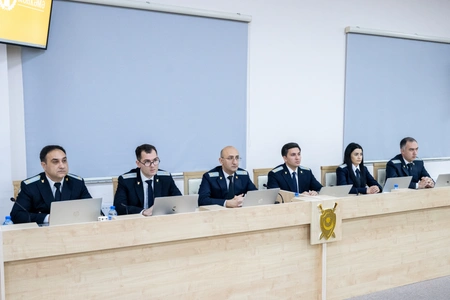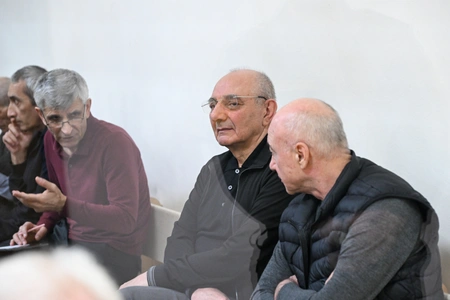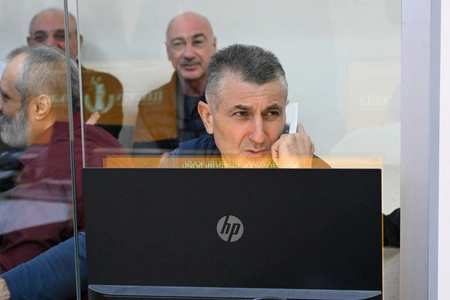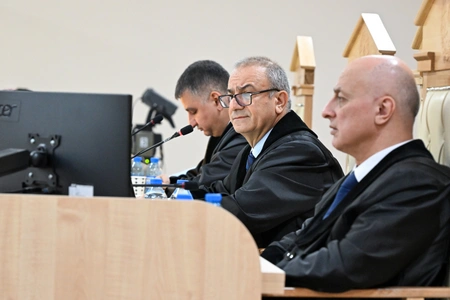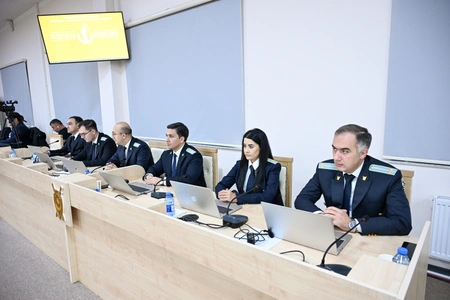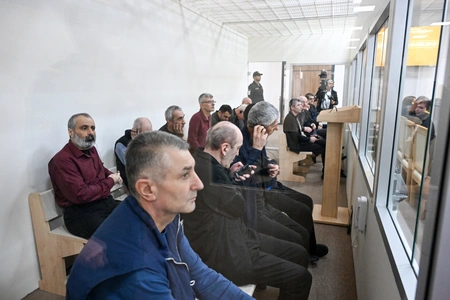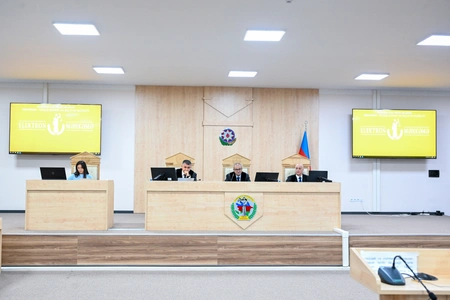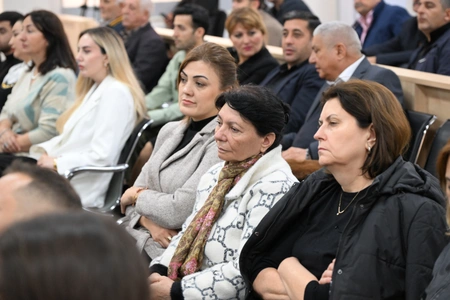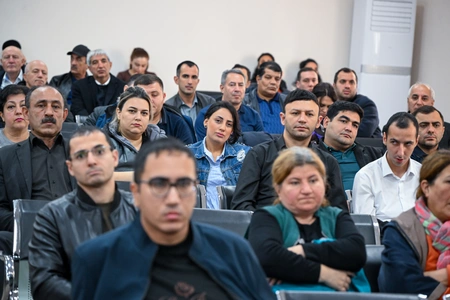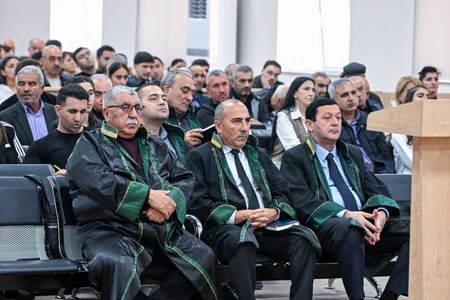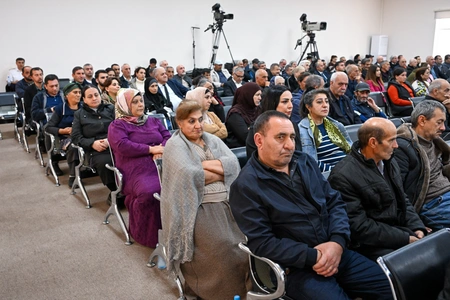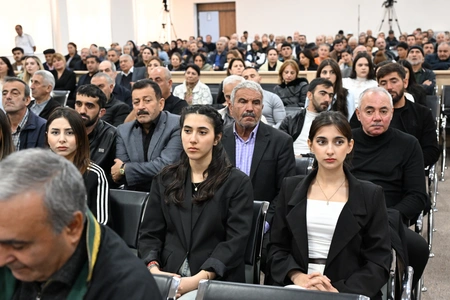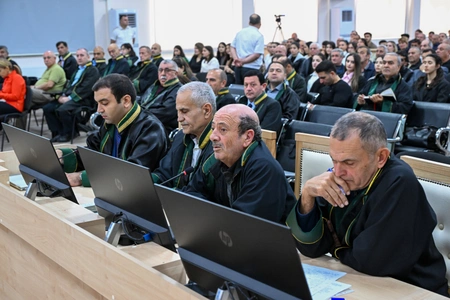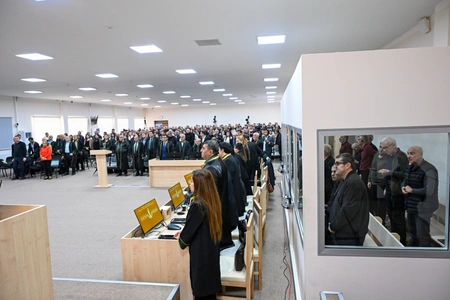Statements regarding torture of Azerbaijanis held in captivity and as hostages by Armenia announced in court
- 23 October, 2025
- 21:03
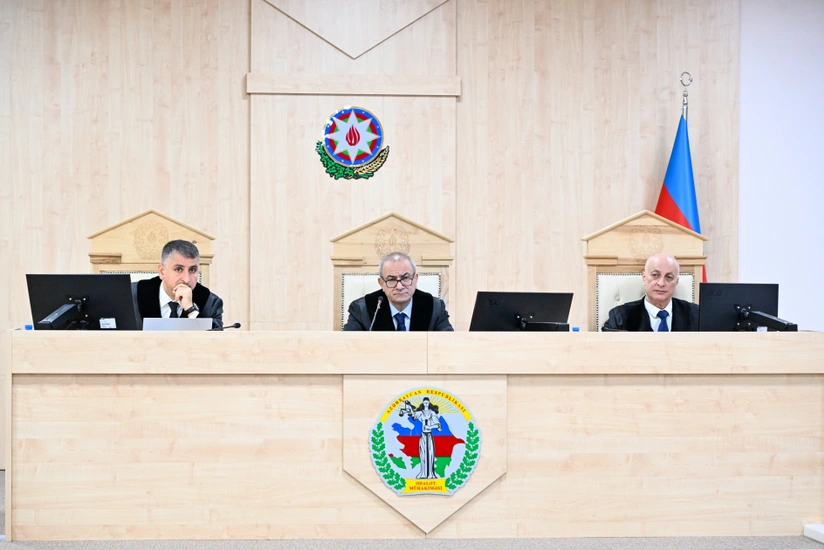
On October 23, the open court hearing regarding the criminal cases against citizens of the Republic of Armenia, including Arayik Harutyunyan, Arkadi Gukasyan, Bako Sahakyan, Davit Ishkhanyan, David Babayan, Levon Mnatsakanyan, and others, accused of committing crimes against peace and humanity, war crimes, including the preparation and conduct of an aggressive war, genocide, violation of the laws and customs of war, as well as terrorism, financing terrorism, forcible seizure and retention of power, and numerous other crimes as a result of Armenia's military aggression against Azerbaijan, continued, Report informs.
The trial, held at the Baku Military Court under the presidency of Judge Zeynal Agayev, with a panel consisting of Jamal Ramazanov and Anar Rzayev (with Gunel Samadova as the reserve judge), ensured that each accused person was provided with a translator in their preferred language and defense attorneys.
The session was attended by the accused, their defense attorneys, some of the victims, their legal heirs and representatives, as well as prosecutors defending the state's accusations.
The presiding judge, Zeynal Agayev, stated that 82 victims had submitted applications to the court, indicating their inability to attend the trial and requesting that their statements from the preliminary investigation be examined during the court proceedings. There were no objections to the victims' absence or to the examination of their preliminary investigation statements.
Subsequently, the statements of victims who were unable to attend the session due to valid reasons and had submitted relevant applications to the court were announced.
According to the announced statement of victim Azad Kamal oglu Tahirov, while in captivity in Armenia, a police officer named Maxim struck him heavily in the mouth with the butt of an automatic weapon, breaking his tooth. Additionally, the same Maxim placed a single bullet in a revolver, spun it, and played a "roulette" game with Tahirov and his fellow captives. He pointed the revolver at Tahirov's head and then at Shahlar Gurbanov"s head, pulling the trigger each time. In both instances, the gun did not fire. However, when the revolver was pointed at Tagi Bayramov's head and the trigger was pulled, the shot fired, resulting in Bayramov's immediate death. At the demand of Armenian military personnel, Tahirov and others took Tagi Bayramov's body to the riverbank and buried it there.
In his statement, Talib Azim oglu Tagiyev reported that on April 10, 1991, near the village of Havuslu in the Jabrayil district, Armenian military personnel stopped the "Zhiguli" car he was in along with Gubad Javad oglu Asadullayev and Gara Salman oglu Mammadov, taking them to the Hadrut police station where they were subjected to torture. During the investigation of this incident, Tagiyev identified V.E. Martirosyan, M.G. Konstandov, and P.M. Ayriyan as the individuals who tortured him during a recognition procedure conducted at the time.
According to the announced statement of Ilham Jabir oglu Agayev, on May 5, 1994, he was wounded and taken captive by Armenian armed forces in an area called the 3rd Sovkhoz in the Tartar district. After being held in the village of Garadaghly for about a month, he was transferred to the Shusha prison. His health deteriorated in Garadaghly due to untreated wounds. As a result, he was sent to the Khankendi city children's hospital, where other Azerbaijani captives and hostages were also held. At the end of June 1994, he was taken to the Shusha prison, then to the Aghbulaq village in the Khojavend district, where approximately 50 captives and hostages were held. During his captivity in Aghbulaq, he was subjected to severe torture.
Victim Vahid Garoglan oglu Rahimov stated in his testimony that on August 28, 1993, during the occupation of the Khanlyg village in the Gubadly district by Armenian armed forces, he and his wife, Fadina Galina Gennadievna, were taken hostage, beaten with rifle butts, fists, and kicks, and held for one day in a water tank before being transferred to the Hadrut settlement. During their captivity, they were repeatedly subjected to severe torture.
Victim Rasim Mammadov noted in his testimony that in the autumn of 1993, he was injured when a shell fired by Armenian armed forces landed near him, causing him to lose consciousness and fall. When he regained consciousness, he found himself in a "Niva" vehicle and realized he had been taken hostage. He was held for two to three weeks in an unknown location before being transferred to a farm in Armenia's Goris district, where he was beaten, mistreated, and subjected to severe torture. He was later taken to Gyumri, where approximately 15-20 other Azerbaijani captives and hostages, whose names he could not recall, were also held.
Victim Nazim Shakir oglu Abdullayev stated in his testimony that he worked as a topographic engineer at Azerbaijan's Southern Water Design Institute from 1988 to 1992. On November 15, 1991, he was taken captive between the cities of Khankendi and Shusha. For three days, he was brutally beaten and subjected to torture, including being deprived of food and water.
According to the testimony of victim Ilham Allahveren oglu Rahimov, during the occupation of the Garadaghly village in the Khojavend district, he, Avaz Mirzayev, Rafiq Mustafayev, Khankishi Hasanov, and Fakhraddin Bahramov were wounded, while Asif Hasanov, Shahmar Ibrahimov, Museyib Nasibov, Nasib Rustamov, Yasin Rahmanov, and Hatam Bahramov were killed.
Niyyat Binnet oglu Ahmadov stated in his testimony that on April 18, 1993, he, his father Binnet, his mother Busat, his sisters Zovgiyya, Shargiyya, and Arzu, as well as neighbors Zubayda, Shamama, and others, hid in a stone cave in the Bashlibel village of the Kalbajar district to save their lives. That day, Armenian military personnel fired at the cave where they were hiding. His relatives Busat, Zovgiyya, Gulgas, Ahliman, Chichak, Yagut, Huseyn, Mahammad, Aygun, Surkhay, and Chingiz died from gunshot wounds. He and other surviving and wounded relatives were taken hostage. An Armenian soldier shot his father Binnet, wounding him in the arm and chest. He and other surviving relatives were taken to Khankendi, where he and other wounded relatives were placed in the Khankendi city children's hospital, while others were held in the Khankendi city kindergarten. Armenian doctors at the hospital did not provide him with painkillers; instead, they tortured him by striking his eye and leg wounds and bandaging them with dirty bandages. He was held in the hospital for approximately eight months. The victim stated that he witnessed guards inflicting severe torture on wounded Azerbaijani captives there.
Victim Solmaz Damir gizi Aliyeva stated in her testimony that on May 8, 1992, Armenian military personnel attacked Shusha. At that time, she and her family members and relatives hid in the basement of their home. The next day, Armenian military personnel took her and her relatives hostage. After being captured, they were beaten with rifle butts and kicks, loaded onto a truck, and taken to a detention facility in Khankendi. There, the men were beaten and separated, while the women and children were placed in a single cell. For four days, they were given no food and were constantly threatened with death and insulted.
Victim Gadir Imamgulu oglu Mammadov stated in his testimony that on August 20, 1993, he was taken captive by Armenian armed forces in the Fuzuli district. After being held in the Shusha prison for about twenty days, he was transferred to the Aghbulaq village in the Khojavend district. He escaped captivity after twenty days and reached the Aghjabadi district. During his captivity, he was subjected to torture.
Khojaly resident Atraba Ahmad gizi Aliyeva stated in her testimony that on February 25, 1992, around 11 p.m., Armenian military personnel shelled the city. She and her relatives fled to the forest, heading toward the Aghdam district. On the way, Armenian military personnel opened fire on them, resulting in the deaths of her sister Malahat's husband, Tapdig, and their 8-year-old daughter. During a second round of shooting, she was wounded in her left leg but managed to reach the Shelli village in the Aghdam district with great difficulty.
Khojaly resident Arif Gudrat oglu Azizov stated in his testimony that until around 8 p.m. on February 26, 1992, he and other Azerbaijani residents hid in a basement in Khojaly, then fled to the forest toward the Nakhchivanly village. On February 27, around 8 a.m., Armenian military personnel surrounded and took them hostage in the Nakhchivanly village.
Khojaly resident Fikrat Javad oglu Valiyev, born in 1965, stated in his testimony that on the night of February 25, 1992, the city was shelled from all sides by tanks and armored vehicles, and houses were set on fire. During the genocide, his brother Fuzuli went missing, and his sister Surayya Valiyeva, as well as Eldar and Rafil Ahmadov, Ul-fat Aliyev, remained in the forest, and there has been no news of them since.
The statements of other victims were also announced during the court session.
The trial will continue on October 24.
Fifteen defendants of Armenian origin are accused in the criminal case concerning numerous crimes committed during the aggressive war waged by the Armenian state - including the aforementioned criminal association - on the territory of Azerbaijan, in violation of domestic and international legal norms. These crimes were committed for the purpose of military aggression against Azerbaijan and were carried out under the direct leadership and participation of the Armenian state, officials of its state institutions, its armed forces, and illegal armed formations, through their written and verbal orders, instructions, and guidelines; material, technical, and personnel support; centralized management; as well as under strict control and under the leadership and direct or indirect participation of Robert Sedraki Kocharyan, Serzh Azati Sargsyan, Vazgen Mikaeli Manukyan, Vazgen Zaveni Sargsyan, Samvel Andraniki Babayan, Vitali Mikaeli Balasanyan, Zori Hayki Balayan, Seyran Musheghi Ohanyan, Arshavir Surenovich Garamyan, Monte Charles Melkonyan, and others.
The following individuals - Arayik Vladimiri Harutyunyan, Arkadi Arshaviri Ghukasyan, Bako Sahaki Sahakyan, Davit Rubeni Ishkhanyan, David Azatini Manukyan, Davit Klimi Babayan, Levon Henrikovich Mnatsakanyan, Vasili Ivani Beglaryan, Erik Roberti Ghazaryan, Davit Nelsoni Allahverdiyan, Gurgen Homeri Stepanyan, Levon Romiki Balayan, Madat Arakelovich Babayan, Garik Grigori Martirosyan, and Melikset Vladimiri Pashayan - are being charged under the following articles of the Criminal Code of the Republic of Azerbaijan: Article 100 (planning, preparing, initiating, and waging a war of aggression); Article 102 (attacking persons or organizations enjoying international protection); Article 103 (genocide); Article 105 (extermination of the population); Article 106 (enslavement); Article 107 (deportation or forced displacement of population); Article 109 (persecution); Article 110 (enforced disappearance of persons); Article 112 (deprivation of liberty contrary to international law); Article 113 (torture); Article 114 (mercenary service); Article 115 (violation of the laws and customs of warfare); Article 116 (violation of international humanitarian law during armed conflict); Article 118 (military robbery); Article 120 (intentional murder); Article 192 (illegal entrepreneurship); Article 214 (terrorism); Article 214-1 (financing terrorism); Article 218 (creation of a criminal organization); Article 228 (illegal acquisition, transfer, sale, storage, transportation, and possession of weapons, ammunition, explosives, and devices); Article 270-1 (acts threatening aviation security); Article 277 (assassination of a state official or public figure); Article 278 (forcible seizure and retention of power, forcible change of the constitutional structure of the state); Article 279 (creation of armed groups not provided for by law); and additional articles.
